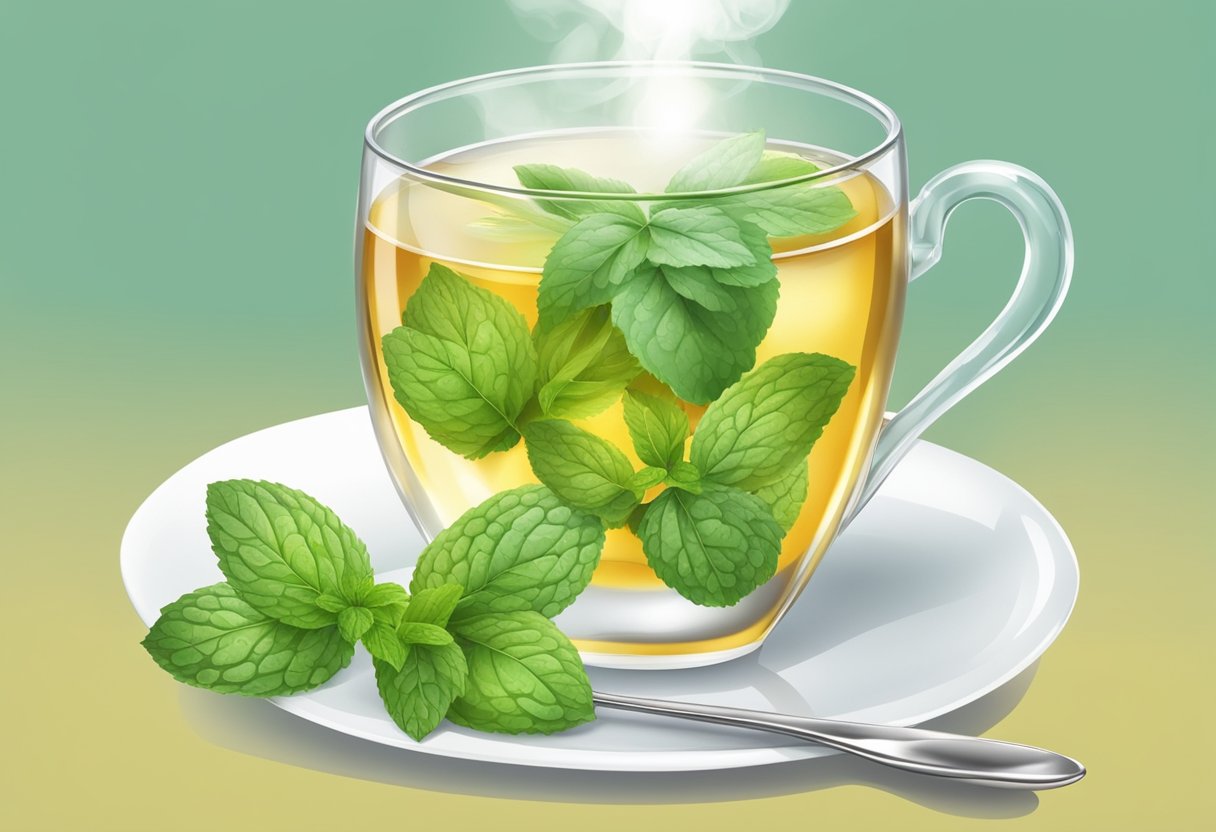Irritable bowel syndrome (IBS) is a common digestive disorder that affects millions of people worldwide. It is characterized by symptoms such as abdominal pain, bloating, and altered bowel habits. While the exact cause of IBS is unknown, it is believed to be related to a combination of factors such as diet, stress, and gut microbiome. There is currently no cure for IBS, but there are various treatment options available to manage the symptoms. One such option is herbal tea, which has been used for centuries to promote digestive health.
Disclaimer: This article is provided for informational purposes only and should not replace professional medical advice. Please consult with a qualified healthcare practitioner or herbalist before using any herbal remedies.

Herbal tea is a natural beverage made from herbs, spices, and other plant materials. It is believed to have various health benefits, including soothing digestive issues such as IBS. Some of the most commonly used herbs in IBS tea include peppermint, ginger, fennel, and chamomile. Peppermint tea, in particular, has been shown to be effective in reducing symptoms such as abdominal pain and bloating. Ginger tea is also believed to be beneficial in reducing inflammation and improving gut motility. Fennel tea is known for its carminative properties, which can help relieve bloating and gas. Chamomile tea is a natural anti-inflammatory and can help soothe the digestive tract.
While herbal tea is generally considered safe, it is important to note that not all herbs are suitable for everyone. Some herbs may interact with medications or cause side effects such as allergic reactions. It is important to consult with a healthcare professional before using herbal tea as a treatment for IBS. Additionally, herbal tea should not be used as a substitute for medical treatment.
Understanding IBS

Irritable Bowel Syndrome (IBS) is a common gastrointestinal disorder that affects millions of people worldwide. It is a chronic condition that causes a range of unpleasant symptoms, including abdominal pain, bloating, and changes in bowel movements.
Symptoms of IBS
IBS symptoms vary from person to person, but some of the most common symptoms include abdominal pain, bloating, gas, and changes in bowel movements. Some people with IBS experience diarrhea-predominant symptoms, while others experience constipation-predominant symptoms.
Causes and Triggers
The exact cause of IBS is not known, but it is believed to be related to a combination of factors, including a sensitive digestive system, poor diet, food intolerances, and stress. Certain foods and drinks can trigger IBS symptoms, such as dairy products, caffeine, and alcohol.
IBS and Lifestyle
Lifestyle changes can help manage symptoms of IBS. Eating a healthy diet, getting regular exercise, and managing stress can all help improve gut health and reduce symptoms.
IBS and Mental Health
Mental health can also play a role in IBS. Stress and anxiety can trigger symptoms, and people with IBS are more likely to experience depression and anxiety. Cognitive-behavioral therapy (CBT) can be an effective treatment for IBS-related anxiety and depression.
IBS and Quality of Life
IBS can have a significant impact on a person’s quality of life. It can affect their work, social life, and overall well-being. It is important for healthcare providers to understand the impact of IBS on a patient’s quality of life and provide appropriate support and treatment.
IBS Diagnosis and Healthcare Providers
Diagnosing IBS can be challenging, as there are no specific tests for the condition. Healthcare providers typically diagnose IBS based on a patient’s symptoms and medical history. Treatment for IBS may include lifestyle changes, medication, and therapy. Mayo Clinic and other clinical practice guidelines provide recommendations for the diagnosis and treatment of IBS.
In summary, IBS is a common gastrointestinal disorder that can cause a range of unpleasant symptoms. It is believed to be related to a combination of factors, including a sensitive digestive system, poor diet, food intolerances, and stress. Lifestyle changes, mental health support, and appropriate medical treatment can help manage symptoms and improve quality of life for people with IBS.
Herbal Teas for IBS

There is good news for those suffering from IBS as herbal teas can help alleviate symptoms of the condition. Herbal teas are made by steeping herbs in hot water and can be consumed either hot or cold. They are a great alternative to fizzy drinks, pre-packaged tea bags, and fruit juices, which can aggravate IBS symptoms. Here are some of the best herbal teas for IBS:
Peppermint Tea
Peppermint tea is one of the most popular herbal teas for IBS. It contains peppermint leaves or peppermint oil and is known for its ability to soothe digestive issues. Peppermint tea can help relieve bloating, gas, and abdominal pain, making it an excellent choice for those with IBS.
Fennel Tea
Fennel tea is another great herbal tea for IBS. It contains fennel seeds, which are known for their ability to reduce bloating and gas. Fennel tea can also help relieve constipation and stomach cramps.
Chamomile Tea
Chamomile tea is a gentle herbal tea that can help relieve IBS symptoms. It contains chamomile flowers, which have anti-inflammatory properties that can help soothe the digestive tract. Chamomile tea can also help relieve anxiety and stress, which can exacerbate IBS symptoms.
Green Teas
Green teas are a great source of antioxidants and can help improve digestion. They contain catechins, which have anti-inflammatory properties that can help reduce IBS symptoms. Green teas can also help boost the immune system and improve overall health.
White Tea
White tea is a gentle tea that is ideal for those with sensitive digestive systems. It is low in caffeine and contains antioxidants that can help reduce inflammation in the gut. White tea can also help improve digestion and relieve constipation.
Black Tea
Black tea is a great source of caffeine and can help improve mental alertness. It contains theophylline, which can help relax the muscles in the digestive tract. Black tea can also help relieve constipation and improve digestion.
Ginger Tea
Ginger tea is a popular herbal tea that can help relieve IBS symptoms. It contains ginger, which has anti-inflammatory properties that can help reduce bloating and gas. Ginger tea can also help relieve nausea and improve digestion.
Turmeric Tea
Turmeric tea is a great source of antioxidants and can help reduce inflammation in the gut. It contains curcumin, which has anti-inflammatory properties that can help relieve IBS symptoms. Turmeric tea can also help improve digestion and boost the immune system.
Fermented Tea
Fermented tea, such as kombucha, can help improve gut health. It contains probiotics that can help restore the balance of bacteria in the gut, which can help reduce IBS symptoms. Fermented tea can also help improve digestion and boost the immune system.
Aloe Vera Tea
Aloe vera tea is a gentle herbal tea that can help soothe the digestive tract. It contains aloe vera, which has anti-inflammatory properties that can help reduce IBS symptoms. Aloe vera tea can also help relieve constipation and improve digestion.
Licorice Root Tea
Licorice root tea is a great herbal tea for those with IBS. It contains licorice root, which has anti-inflammatory properties that can help reduce bloating and gas. Licorice root tea can also help relieve constipation and improve digestion.
In conclusion, herbal teas are a great way to alleviate IBS symptoms. They can help reduce bloating, gas, abdominal pain, constipation, and improve digestion. Peppermint tea, fennel tea, chamomile tea, green teas, white tea, black tea, ginger tea, turmeric tea, fermented tea, aloe vera tea, and licorice root tea are some of the best herbal teas for IBS.
How Herbal Teas Help with IBS

Herbal teas have been used for centuries as a natural remedy for various ailments. In recent years, they have gained popularity as a treatment option for irritable bowel syndrome (IBS). Here are some ways that herbal teas can help with IBS:
Role of Essential Oils
Many herbal teas contain essential oils that have a calming effect on the digestive system. These oils can help reduce inflammation and spasms in the gut, which can alleviate symptoms of IBS.
Herbal Teas and Digestive Health
Herbal teas can promote digestive health by stimulating the movement of food through the digestive tract. This can help prevent constipation and bloating, which are common complaints among people with IBS.
Herbal Teas and Gut Health
Herbal teas can also help promote the growth of good bacteria in the gut. This is important because the balance of bacteria in the gut plays a crucial role in overall gut health.
Herbal Teas and Abdominal Muscles
Some herbal teas can help relax the abdominal muscles, which can reduce cramping and discomfort associated with IBS.
Herbal Teas and Nervous System
Herbal teas can have a calming effect on the nervous system, which can help reduce stress and anxiety. Since stress and anxiety are known triggers for IBS symptoms, this can be particularly beneficial for people with IBS.
Herbal Teas and Small Intestinal Bacterial Overgrowth
Herbal teas can also help address small intestinal bacterial overgrowth (SIBO), which is a common underlying cause of IBS. Certain herbs, such as peppermint, have been shown to have antimicrobial properties that can help reduce the overgrowth of harmful bacteria in the gut.
Herbal Teas and Inflammatory Bowel Disease
Herbal teas can also be beneficial for people with inflammatory bowel disease (IBD), which is a chronic inflammatory condition that affects the digestive tract. Certain herbs, such as turmeric, have anti-inflammatory properties that can help reduce inflammation in the gut.
Herbal Teas and Gastroesophageal Reflux Disease
Herbal teas can also be helpful for people with gastroesophageal reflux disease (GERD), which is a condition that causes acid reflux and heartburn. Certain herbs, such as chamomile, can help soothe the stomach and reduce acid reflux symptoms.
Herbal Teas and Heart Disease
Herbal teas can also be beneficial for heart health. Certain herbs, such as hibiscus, have been shown to help lower blood pressure and cholesterol levels, which can reduce the risk of heart disease.
Herbal Teas and Weight Loss
Herbal teas can also be helpful for weight loss. Certain herbs, such as green tea, have been shown to boost metabolism and aid in weight loss efforts.
Herbal Teas and Blood Sugar Levels
Herbal teas can also help regulate blood sugar levels. Certain herbs, such as cinnamon, have been shown to help lower blood sugar levels and improve insulin sensitivity.
Herbal Teas and Menstrual Cycle
Herbal teas can also be helpful for women’s health. Certain herbs, such as ginger, can help alleviate menstrual cramps and other symptoms associated with the menstrual cycle.
Overall, herbal teas can be a safe and effective treatment option for people with IBS. However, it is important to note that not all herbal teas are created equal. It is important to consult with a healthcare provider before using herbal teas as a treatment for IBS or any other health condition.
Scientific Evidence and Clinical Trials

Small Studies
There have been some small studies examining the effects of herbal tea on IBS symptoms. For example, one study found that a blend of chamomile, peppermint, and fennel tea reduced symptom severity in patients with IBS. However, these studies have limitations, such as small sample sizes and lack of control groups.
Clinical Trials
More clinical trials are needed to determine the efficacy of herbal tea for IBS. While there is some clinical evidence supporting the use of herbal tea for IBS symptoms, larger and more rigorous trials are needed to confirm these findings.
Control Group Studies
Control group studies are important in determining the effectiveness of herbal tea for IBS. For example, a randomized, double-blind, placebo-controlled trial found that a blend of peppermint and caraway tea significantly reduced IBS symptoms compared to a placebo group.
Positive Results
There is some positive evidence supporting the use of herbal tea for IBS symptoms. For example, a systematic review of clinical trials found that peppermint oil was effective in reducing IBS symptoms. Additionally, chamomile tea has been shown to reduce inflammation and improve gut health in animal studies.
Overall, while there is some scientific evidence supporting the use of herbal tea for IBS symptoms, more research is needed to confirm these findings. However, herbal tea may be a safe and natural option for those looking to manage their IBS symptoms.
Considerations and Precautions

Dietary Considerations
For IBS sufferers, incorporating herbal tea into their diet can be a great way to ease symptoms. However, it’s important to keep in mind that some teas may not be suitable for everyone. Those following a low FODMAP diet should be cautious when selecting teas, as some may contain high FODMAP ingredients such as honey or fruit.
Delivery Times
When ordering herbal tea, it’s important to consider delivery times. Some teas may take longer to arrive than others, so it’s important to plan ahead if you need the tea for a specific occasion or event.
Side Effects
While herbal tea is generally considered a safe and natural remedy, it’s important to be aware of potential side effects. Some teas may cause gastrointestinal upset or interact with certain medications. It’s always a good idea to speak with a healthcare provider before adding herbal tea to your routine.
Alternative Medicine
Herbal tea is a popular form of alternative medicine, and many traditional medicines incorporate herbal remedies. Traditional Chinese medicine, for example, often utilizes herbal teas to treat a variety of ailments.
Prescription Medications
If you are currently taking prescription medications, it’s important to speak with your healthcare provider before incorporating herbal tea into your routine. Some teas may interact with certain medications, potentially causing harmful side effects.
Effective Treatment
While herbal tea may not be a cure-all for IBS, it can be a good addition to an overall treatment plan. When combined with other lifestyle changes such as a healthy diet and enough water intake, herbal tea can help ease symptoms and improve quality of life.
Hydration
In addition to its potential benefits for IBS, herbal tea can also help with hydration. Drinking enough water is essential for overall health, and incorporating herbal tea into your routine can be a good way to stay hydrated throughout the day.
Artificial Sweeteners
Some herbal teas may contain artificial sweeteners, which should be avoided by those with IBS. Artificial sweeteners can cause gastrointestinal upset and may exacerbate symptoms.
Health Benefits
In addition to its potential benefits for IBS, herbal tea has been shown to have a variety of health benefits. Many teas have anti-inflammatory properties, which can help reduce inflammation throughout the body. Additionally, some teas have been shown to improve cognitive function and reduce stress levels.







